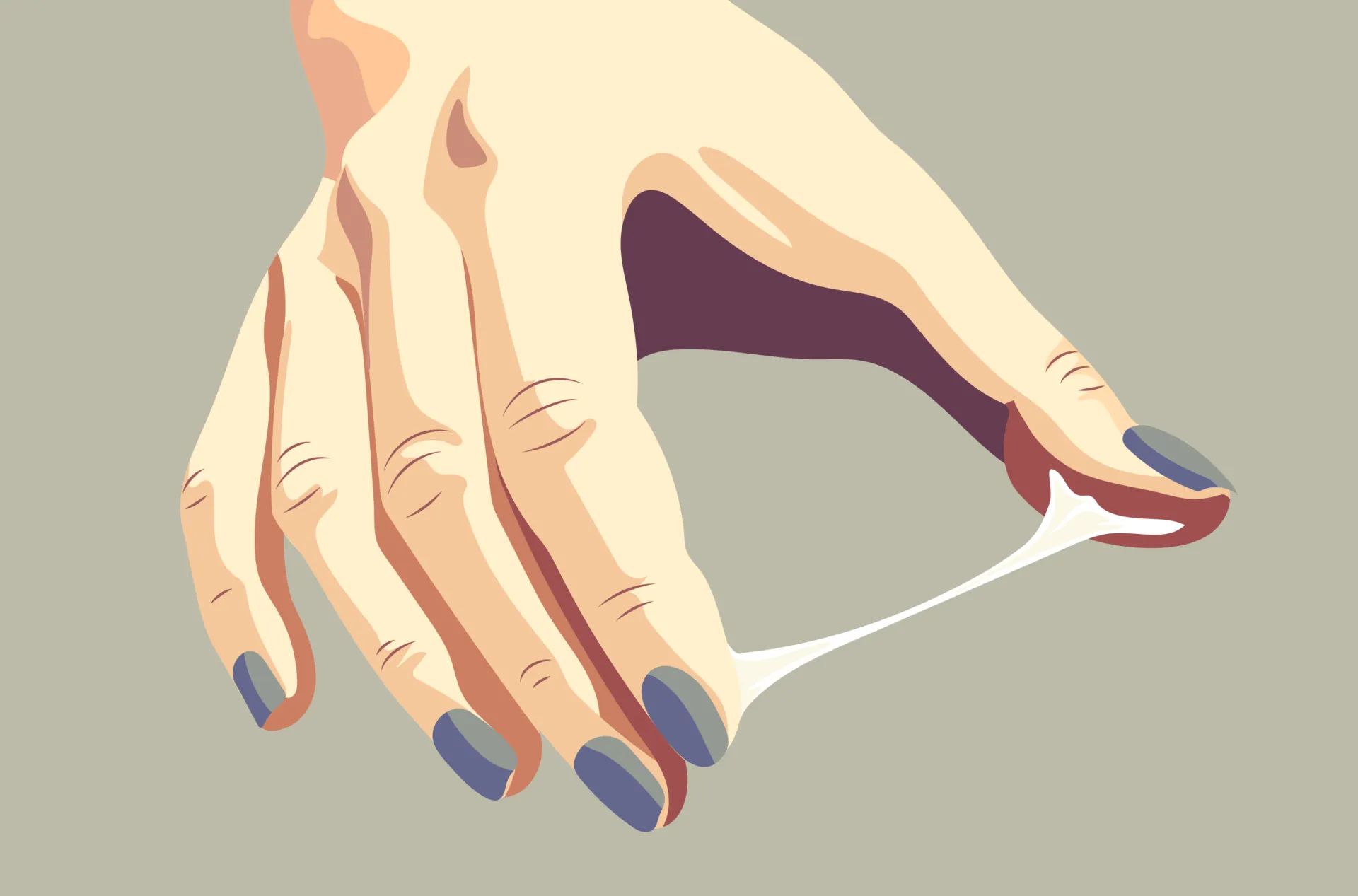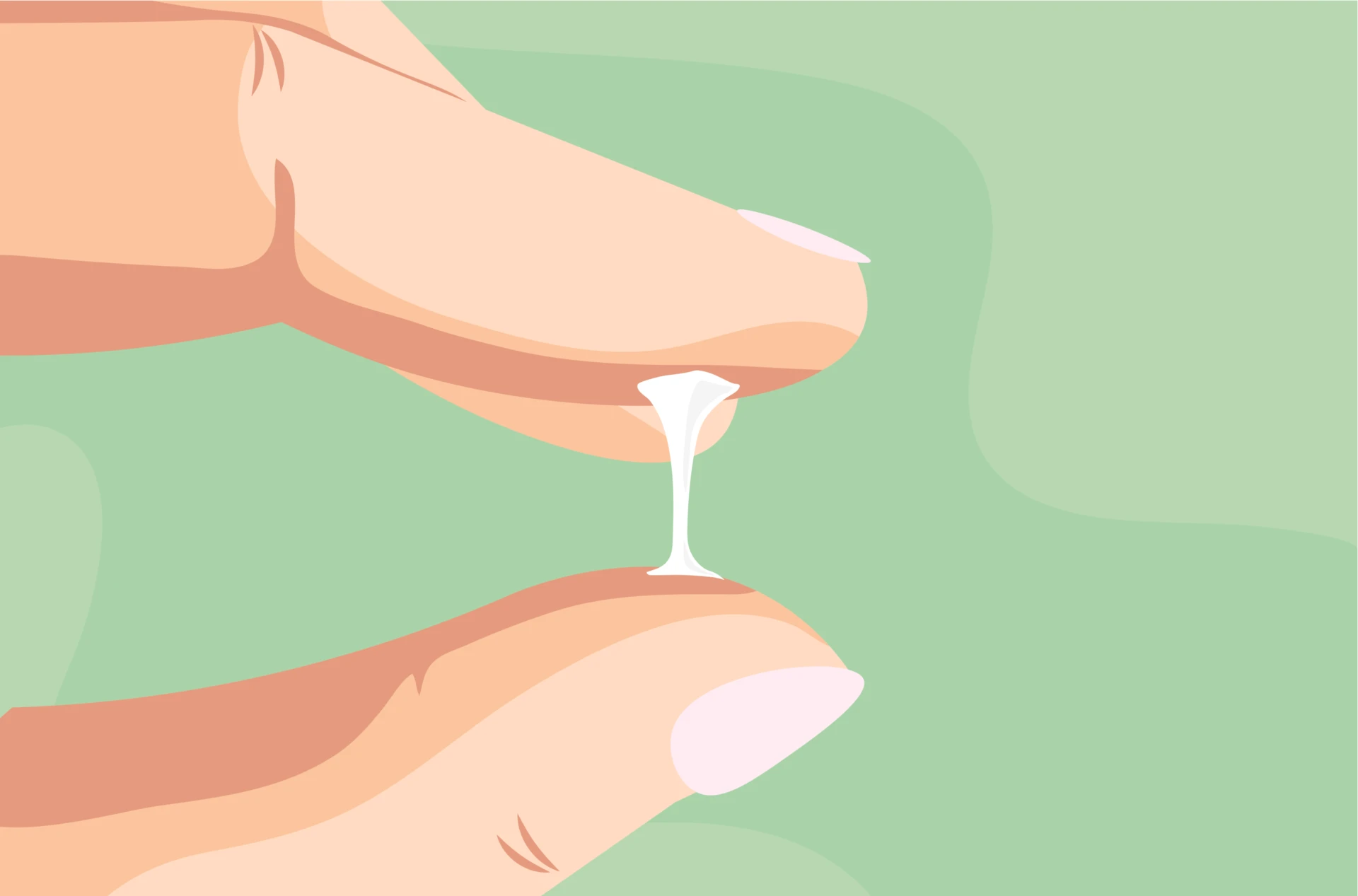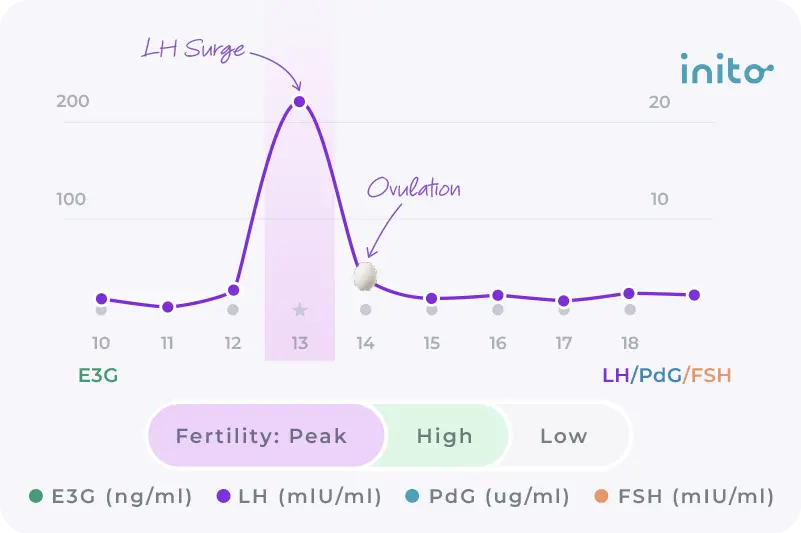Content table
Have you ever wondered why your menstrual cycle is getting longer? Or why your period sometimes shows up a few days later than you expected? If so, know that it’s totally normal.
Getting your period a few days later than usual isn’t anything to be worried about. Your body doesn’t always work like a clock, and your menstrual cycle length can vary.
In fact, 69% of women experience cycle variations of up to 6 days. Additional studies show that 46% of women have cycles that vary by more than 7 days. So, if you have a 28-day cycle one month, and a 33-day cycle the next period, there’s no need to stress.
However, if your periods consistently last longer than 35 days, or you have less than 9 menstrual periods per year, it means your menstrual cycle is getting longer. This can lead to irregular cycles. Let’s take a deeper look to understand the possible reasons behind this shift.
Key takeaways
- The average menstrual cycle ranges from 21 and 35 days.
- A 7-day variation in menstrual cycles is considered normal.
- Consistently having periods longer than 35 days apart or less than 9 periods per year may signal an issue.
- Factors like age, PCOS, thyroid issues, hormonal birth control, weight, stress, excessive exercise, and lifestyle changes can lead to an irregular menstrual cycle.
- If you have heavy bleeding, severe pain, excessive acne and facial hair, or weight changes, talk to a doctor.
- You can regulate your cycles by improving your health. This includes a balanced diet, moderate exercise, stress management, and adequate sleep.
- Tracking your cycle with a fertility monitor like Inito can help you better understand your menstrual cycle.
Understanding your cycle length
A healthy, normal menstrual cycle length typically falls between 21 and 35 days. This means ovulation happens about 12-14 days before your next period.
But note that your cycle may be longer or shorter than this range and it can vary from month to month, too.
A normal menstrual period is one that:
- Comes regularly (every 21-35 days)
- Lasts for 2-8 days,
- Has an average of about 30 mL of menstrual blood lost per cycle
- Involves mild and manageable pain or other symptoms (not interfering with day-to-day activities)
But when your menstrual cycle keeps getting longer and goes beyond 7 days late, there may be an issue.
Causes for menstrual cycle getting longer
1. Age
As you get closer to your mid-40s, your body may enter a stage called perimenopause. This is the transition period before menopause. And it’s when your body starts slowly preparing to stop having periods entirely. During perimenopause, your hormone levels fluctuate, which commonly leads to irregular menstrual cycles. Follicle-stimulating hormone (FSH) and luteinizing hormone (LH) increase, while estrogen and progesterone decrease. This can make your menstrual cycle length longer or shorter. It can also cause your flow to be lighter or heavier. And you may skip periods entirely or have anovulatory periods. One study found that for women over the age of 45, menstrual cycle lengths varied greatly. With those hormone shifts and cycle length changes often come additional symptoms. These include:- Hot flashes
- Mood changes
- Sleep issues
- Vaginal dryness
- Nausea and bloating
- Decreased sex drive
2. Puberty
Just like perimenopause, puberty is a period of significant hormonal changes. During your teenage years, your body and brain are figuring out how to navigate this new concept of a menstrual cycle and your period. Your menstrual cycle is controlled by signals that come from the brain via the hypothalamic-pituitary-ovarian axis. And during puberty, this axis is still immature. This can result in irregular menstrual bleeding. This may look like periods that are longer or shorter or even MIA entirely. It takes about 2 years for your hormonal system to mature and settle into what will become your normal cycles.3. Polycystic Ovary Syndrome (PCOS)
This hormonal disorder affects many women — 1 in 10 women of childbearing age. It is the leading cause of anovulation, which is when your body doesn’t release an egg during ovulation. PCOS accounts for 80% of anovulation cases, which can lead to fertility struggles. Polycystic ovary syndrome is when tiny cysts that contain immature eggs develop in your ovaries. These immature eggs fail to release during ovulation, which means your periods are affected. Your menstrual cycle may become irregular, longer, or shorter, or you may even have a missed period. The exact cause of PCOS is still a mystery. But scientists know this: It involves your body producing excess androgens (male sex hormones) which causes cysts to form in your ovaries. The extra androgen also affects your body’s secretion of gonadotropin-releasing hormone (GnRH). This results in high LH levels and low FSH levels. And this has a domino effect on your menstrual cycles and your fertility. Learn more: PCOS And Pregnancy: All You Need To Know4. Thyroid issues
Your thyroid gland plays a vital role in regulating hormones, including those that control your menstrual cycle. A malfunctioning thyroid means it’s either hyperactive (hyper) or underactive (hypo). This can affect your body’s production, transportation, and elimination of estrogen and progesterone. These hormones are key to your menstrual cycle. So, thyroid dysfunction can mess with ovulation and lead to an irregular and maybe even missed period.5. Hormonal birth control
If you’re taking hormonal birth control, you may find that your periods are delayed. That’s because hormonal birth control methods alter your hormone levels. Though that’s what they’re intended to do, it can take time for your body to adjust. When you first start using birth control, it’s normal to experience some changes in your cycle for the first 3-6 months. These changes can look like delayed periods, light periods, and maybe even no periods at all. This is just your body adjusting to new hormone levels. Hormonal birth control may also affect your menstrual cycle if:- You recently switched your birth control
- You forgot to take your birth control
- You don’t take your birth control regularly
- You used an emergency birth control pill (Plan B)
6. Weight
Being overweight or obese can affect your hormones. Studies show that people in these weight categories have longer menstrual cycles and are more likely to experience irregular periods than people with a healthy weight. That’s because being overweight can mess with your hormones, especially insulin and leptin. And these hormones play a big role in regulating your menstrual cycle. Also, fat cells can produce a type of estrogen called estrone. Too much estrone can confuse your body’s hormone system (hypothalamic-pituitary-ovarian axis). This may cause an imbalance in your estrogen-progesterone ratio. This makes it harder to ovulate regularly and maintain a normal menstrual cycle. Learn more: BMI and Baby-making: The Surprising Link Between Weight and Female Fertility7. Chronic stress
Chronic stress can take a toll on your body, including your menstrual cycle. Your body’s hypothalamic-pituitary-ovarian axis controls your hormones, including those that affect your period. This system is a delicate balance. When you’re stressed, your body releases hormones that interfere with this balance. This can prevent the release of GnRH and LH and also decrease estrogen secretion. The effect? Your LH levels surge gets delayed, and so does ovulation. This can lead to irregular periods.8. Excessive exercise
You may think you’re being healthy, but exercising too much can actually do more harm than good. This is especially true when it comes to your menstrual cycle. Exercising too much suppresses your body’s hypothalamus, which can lead to lower FSH and LH secretion. The result of this is irregular periods or no periods at all. On top of that, more than 60 minutes of heavy workouts can reduce your fat cells too much. This can lead to low estrogen levels, which may affect your period and can cause anovulation.9. Lifestyle changes
All of the systems in your body are connected. This means that if you make any changes to your diet, exercise, sleep, or stress levels, your period may be affected. These shifts can cause your menstrual cycle to become irregular, longer, shorter, lighter, or heavier.When to see a doctor
If your late period is a one-off thing, there’s likely nothing to worry about. But, if your cycles are consistently longer than 35 days, or you’re experiencing other symptoms like:
- Excessive bleeding
- Painful periods that interfere with daily activities
- Severe pelvic pain at other times during your cycle
- Signs of excess androgens (facial hair, acne, body hair growth)
It’s best to see a doctor to rule out any underlying conditions or issues. Your menstrual cycle is a vital sign of your overall health.
Additionally, if you think you might be pregnant, take a pregnancy test.
What to do about longer menstrual cycles
If you’re experiencing prolonged periods, the first step is to find out the underlying cause and get it treated.
You also want to focus on a healthy lifestyle to keep your menstrual cycle length regular. Here are other things you should incorporate.
Healthy diet
To improve your cycle length and menstrual health, your diet needs to include foods that improve insulin sensitivity. These include:
- Complex carbs
- Fiber
- Lean meats
For those with PCOS, you may also want to try seed cycling to help regulate your period. Fermented foods and omega-3s show promise, too.
Learn more: Diet & Fertility: Eat Your Way to Better Baby Odds!
Physical activity
Exercise is a great thing unless you’re doing too much of it.
Aim for 30-60 minutes of strenuous exercise on a regular basis. Any more than 60 minutes, and you’re increasing your risk of anovulation.
It’s important to not reserve your physical activity only for the gym. Incorporate movement into your day by doing things like:
- Climbing stairs
- Using a standing desk
- Going on short walks
- Parking farther away
- Doing house chores
Stress management
Sometimes life stressors happen that are out of our control.
The key is to have tools that help downregulate and bring you back to a state of peace. Your body requires this.
Some of our favorite stress management tools are:
- Yoga
- Deep breathing
- Meditation
- Journaling
- Talking with a friend or loved one
- Going for a walk
- Dancing
Sleep
Sleep is integral to every system in the human body, including your period. Improper sleep can wreak havoc on your menstrual cycle length.
To avoid that, aim for 8 hours of sleep per night — a dark room is best. This is how your body’s natural melatonin production thrives. Studies show that FSH levels are 20% higher in women who sleep for longer periods of time.
On top of that, for every extra hour of sleep you get, your progesterone levels can increase by almost 10%. Higher progesterone levels help regulate your period and lead to healthier menstrual cycles.
Learn more: How To Increase Progesterone To Get Pregnant?
Also, try to go to sleep and wake up around the same time every day. This helps keep your body clock in tune and keeps your estrogen in check. Research shows estradiol is 60% lower for women who stick to a regular sleep schedule.
Track your cycles
The best way to get a full picture of your hormones is to measure them using a fertility monitor like Inito. With this, you can track 4 key fertility hormones – LH, estrogen, PdG (urine metabolite of progesterone), and FSH – which helps you track and confirm ovulation on a single test strip. And if you notice any ovulation or menstrual irregularities, you can discuss with your doctor.

FAQs
It’s normal for your cycle length to vary every month. A cycle that’s between 21 and 35 days long is considered normal.
Your menstrual cycle length can be affected by a number of things in your life.
Sudden change is usually due to lifestyle-related factors like:
- Stress
- Weight
- Excessive exercise
- Eating habits
- Sleep
Once you correct the above factors, your period length should return to normal.
You may be experiencing a shorter menstrual cycle for some of the same reasons that you may be having an extended cycle:
- Age
- Puberty
- PCOS
- Thyroid issues
- Hormonal birth
- control
- Weight
- Stress
- Excess exercise
- Lifestyle changes
Learn more: Why Is My Menstrual Cycle Getting Shorter? – Inito
Your light, prolonged period may not be a problem if it’s a one-off thing. If it’s happening more often, it could be due to birth control, lifestyle changes, or an underlying issue. If you’re worried, it’s best to talk to a healthcare professional.
It’s common for your menstrual cycle to be longer than usual with hormonal shifts. As you approach menopause, the length of your menstrual cycles can change in many ways, including getting longer.
An occasional 40-day cycle is normal – but if you previously had regular cycles (21-35 days length) and you’re consistently getting longer cycles, talk to a doctor.
If you’re constantly having cycles that lasts more than 35 days, or you have less than 9 periods in a year, it’s considered a long menstrual cycle.
No, 31 days is considered a normal or average menstrual cycle.
Was this article helpful?
- Menstrual Cycle Length and Patterns in a Global Cohort of Women Using a Mobile Phone App: Retrospective Cohort Study | PubMed Central
- Development of the first urinary reproductive hormone ranges referenced to independently determined ovulation day | ResearchGate
- Oligomenorrhea | NIH
- Menstrual cycle: What’s normal, what’s not | Mayo Clinic
- Perimenopausal Bleeding and Bleeding After Menopause | ACOG
- Associations of LH and FSH with reproductive hormones depending on each stage of the menopausal transition | PubMed Central
- Menstrual cycle length variation by demographic characteristics from the Apple Women’s Health Study | Nature
- Hypothalamo-Pituitary axis and puberty | ScienceDirect
- Anovulation | PubMed Central
- The management of anovulatory infertility in women with polycystic ovary syndrome: an analysis of the evidence to support the development of global WHO guidance | Oxford Academic
- The role of gonadotropin‐releasing hormone neurons in polycystic ovary syndrome | PubMed Central
- A New Perspective on Thyroid Hormones: Crosstalk with Reproductive Hormones in Females | PubMed Central
- Unscheduled bleeding and contraceptive choice: increasing satisfaction and continuation rates | PubMed Central
- Calculate Your Body Mass Index | NIH
- The effects of obesity on the menstrual cycle | PubMed Central
- Endocrine disruption and obesity: A current review on environmental obesogens | PubMed Central
- Effect of Stress on the Activity of the Hypothalamic-Pituitary-Gonadal Axis: Peripheral and Central Mechanisms | Oxford Academic
- Effect of Exercise on Ovulation: A Systematic Review | Springer Nature
- Effectiveness of combined seeds (pumpkin, sunflower, sesame, flaxseed): As adjacent therapy to treat polycystic ovary syndrome in females | PubMed Central
- Xenoestrogen | ScienceDirect
- Impact of sleep patterns upon female neuroendocrinology and reproductive outcomes: a comprehensive review | BMC












